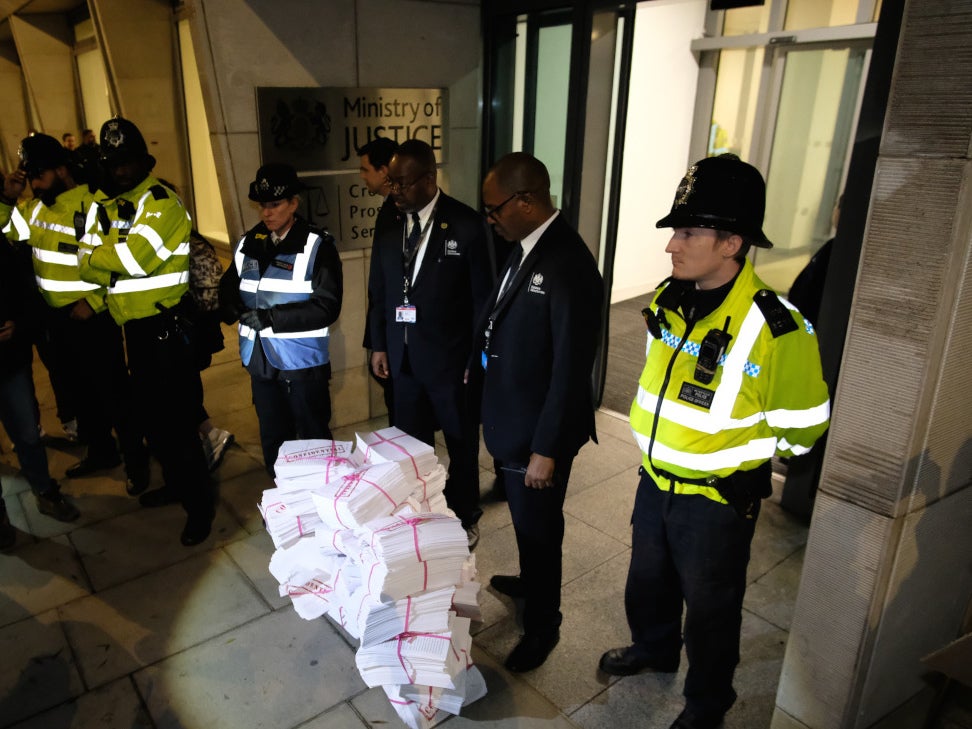Government must reject 'poor' watchdog report on falling rape prosecutions, women's groups say
Inspectorate praised CPS decision-making after the proportion of reported rapes charged fell to 1.4%

Campaigners are demanding that the findings of a “poor and inconclusive” report on the way rape cases are prosecuted is rejected by the government.
Groups including the End Violence Against Women Coalition have written to the attorney general, who oversees HM Crown Prosecution Service Inspectorate (HMCPSI), with their concerns.
In a report issued in December, the watchdog commended CPS decision-making despite rape prosecutions falling to just 1.4 per cent of reported offences.
It suggested that austerity-hit police forces were at fault for “losing rape allegations in the investigative process”, and found no evidence of allegations that the CPS had changed that way it chooses cases to take forward.
Campaigners have written to the attorney general calling from him to “reject the HMCPSI report” because it does not answer the questions needed and look at alternative methods of investigation.
The letter accused the watchdog of making a “poor and inconclusive examination of ‘admin finalised’ cases”, containing “serious errors and inaccuracies in relation” to CPS training and a “lack of professional curiosity” over the reasons why the rape charging rate is collapsing in England and Wales.
The HMCPSI report forms part of a wider review of the handling of rape cases throughout the criminal justice system, which is due to be published this year.
The End Violence Against Women Coalition said “granular analysis” of prosecutors’ decision-making was lacking and urged the attorney general, Geoffrey Cox, to find a new way of examining it.
Director Sarah Green said: “We do not criticise a significant HM Inspectorate report lightly, but our concerns are so serious that we felt we needed to put them on record and alert those who are making decisions about the next steps of the rape review.
“It was commissioned because of obvious, alarming changes in the numbers of women and men seeking justice and actual outcomes. “
The group has already launched an ongoing legal challenge against the CPS that accuses it of covertly changing the way it prosecutes alleged rapists, which the authority denies.
Senior police officers have accused prosecutors of “raising the bar” of evidence required to take rapists to court, following a 2017 scandal over collapsed cases that sparked an overhaul of evidence disclosure.
But HMCPSI said prosecutors were correctly applying the code used for all crimes, which states that only those with a “realistic prospect of conviction” can proceed.
“Of the cases that have come to the CPS, our view is they are applying the test more accurately than when we last looked at this matter,” Chief Inspector Kevin McGinty told The Independent last month.
A 2016 inspection found that the CPS was wrongly applying the code in one in 10 cases, but the new report found the figure had fallen to 2 per cent.

“The CPS has been accused of only choosing easy cases to prosecute, but we found no evidence of that in our report,” Mr McGinty said.
“While the CPS needs to improve the way it works with the police, it is only a small part of a larger systemic problem in the criminal justice process in dealing with complex cases.
“More work is needed to investigate the discrepancy between the number of cases reported and the number of cases prosecuted. This is a matter for the government to consider.”
In 2018-19, 58,657 rape cases were reported but only 5,114 cases were passed on to the CPS, and 1,925 resulted in a successful prosecution.
The report said more victims were withdrawing during police investigations for reasons including stress, trauma, lack of information or the time it takes investigations to progress.
The victims commissioner, Dame Vera Baird, said independent research by people “who will look outside of the CPS culture from the vantage point of victims” was needed.
“They say the decision-making is OK but there are regional variations,” she added.
A government spokesperson called the findings “deeply concerning” when the report was released, adding: “We are conducting a full review of the criminal justice system’s response, recruiting 20,000 more police, giving £85m to the Crown Prosecution Service, creating extra prison places and making sure violent and sexual offenders spend longer behind bars.”
Bookmark popover
Removed from bookmarks